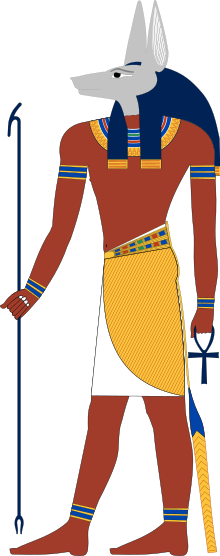Talk:Wepwawet
| This article is rated Start-class on Wikipedia's content assessment scale. It is of interest to the following WikiProjects: | |||||||||||||||||||||||||||||
| |||||||||||||||||||||||||||||
Osiris[edit]
Wasn't it Osiris who took over Wepwawet in the 12th century rather than the other way round? ya i think so
north vs south[edit]
distinguish north vs south wepwawet, and esp note that north wepwawet was royal ancestor of all pharaohs; we see him also reflected as in Celt names as Godwolf proving hint of merging of Egyptian religion with Celts religion; ...Wepwawet merges with wadjet as they conjoin and so are part of the same influences upon pharaohs, in their ceremonies esp of opening of mouth...which is not ab dead having mouth re opened to speak again, but ab living becoming able to speak fully... yowsa, yowsa adz wolfsprechenzie 69.121.221.97 (talk) 01:18, 2 July 2009 (UTC)
Macedon[edit]
why there is no mention that wepwawet was renamed or merged with hellenistic Macedon?89.205.59.148 (talk) 17:44, 7 January 2017 (UTC)
Request for File Use[edit]

Hello! I am requesting for this file I made to used on this Article. It can be very helpful and useful for those interested. Thank you! Louis7892 (talk) 03:40, 11 February 2022 (UTC)
Dogs are thought to be much more ancient and not polyphyletically derived from local wolf populations[edit]
While local dog/wolf hybrids probably occurred all over the place (possibly even making it more difficult to assess the geographic origins of dogs, biasing towards the regions were dogs later became more common, while having still contact with wolves), dogs of any given region were probably never domesticated "from scratch" from local wolves, as the "animal origin" suggests for the ancient Egypt at least. It's also dubious that these species are particularly enigmatic.--45.234.133.155 (talk) 03:45, 10 April 2022 (UTC)
Blasphemous and derogatory tone of article compared to other articles.[edit]
I want to bring up the subject of blasphemy and derogation (malicious intent) regarding this particular article dedicated to Wepwawet (real name Ur or Ur-Ra).
As is proved by numerous sources such as Richard H. Wilkinson: "The Complete Gods and Goddesses of Ancient Egypt" Ur is one of the oldest deities to humanity and they all unanimously state and agree on his integrity, purpose and significance without any ambiguity.
It is clear to see by any human eye Ur is regarded as the mascot and scout for the Pharaoh sent out to protect on his journey and gather recon. It is also plain to see in the many funerary texts written about him that he was held in extreme high regard in the afterlife and was given an important duty there relative to the importance of other revered deities such as Awu (Anubis) and Oshir (Osiris).
The tone of this article is inappropriate and does not endorse the truth or real facts of importance of one of humanities earliest and most venerated deities. A simple Google search for both text and images reveals more than enough information to declare Ur as a succinct, separate and very real deity (identity).
I personally view the way this article has been written with such arrogant assumption and disregard as karmic and a dirty mark on humanities acceptance of heritage and history.
I declare it should be written as absolute fact like any other clearly venerated deities article. 2A00:23C8:AB80:8001:C154:B859:5830:400D (talk) 22:02, 26 July 2022 (UTC)
Music sheet[edit]
Does anybody have any sources or references for Wepwawet creating the music sheet using lines (dashes)? It was just a stone slab with lines etched to signify humming notes; vertical = same note as previous ascending dash = increase descending dash = decrease pitch if I remember rightly. Ts4221 (talk) 18:18, 17 August 2022 (UTC)



